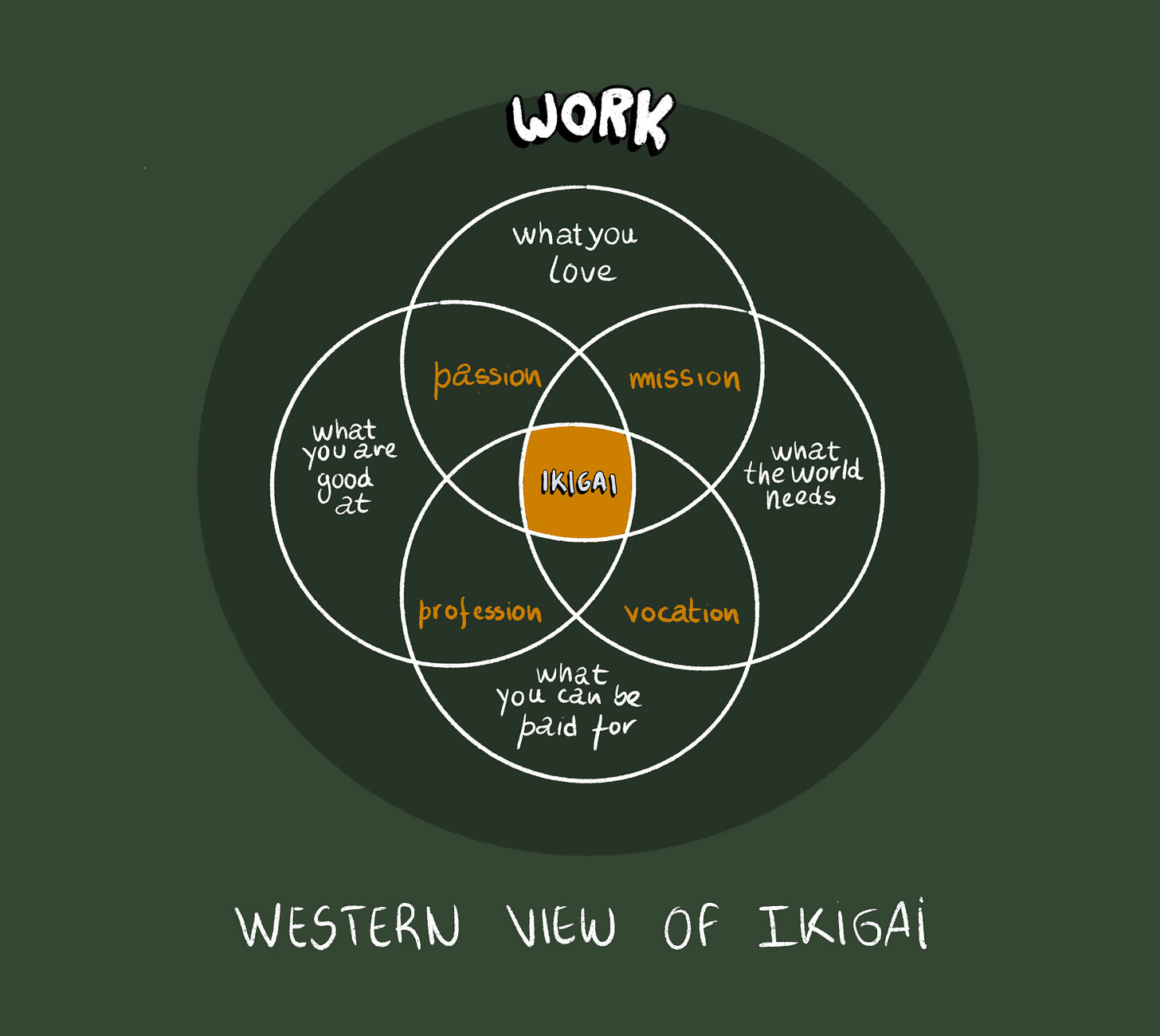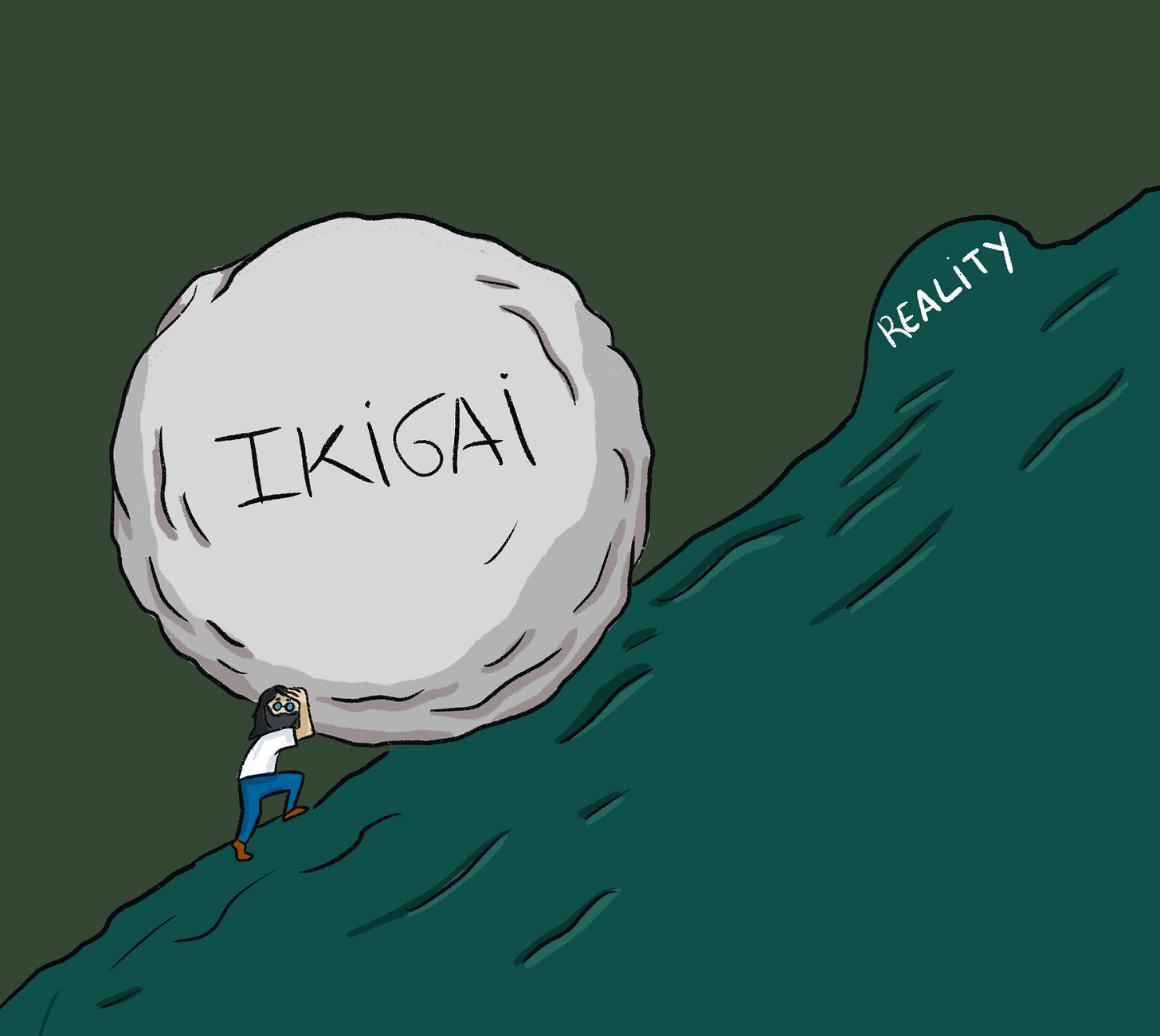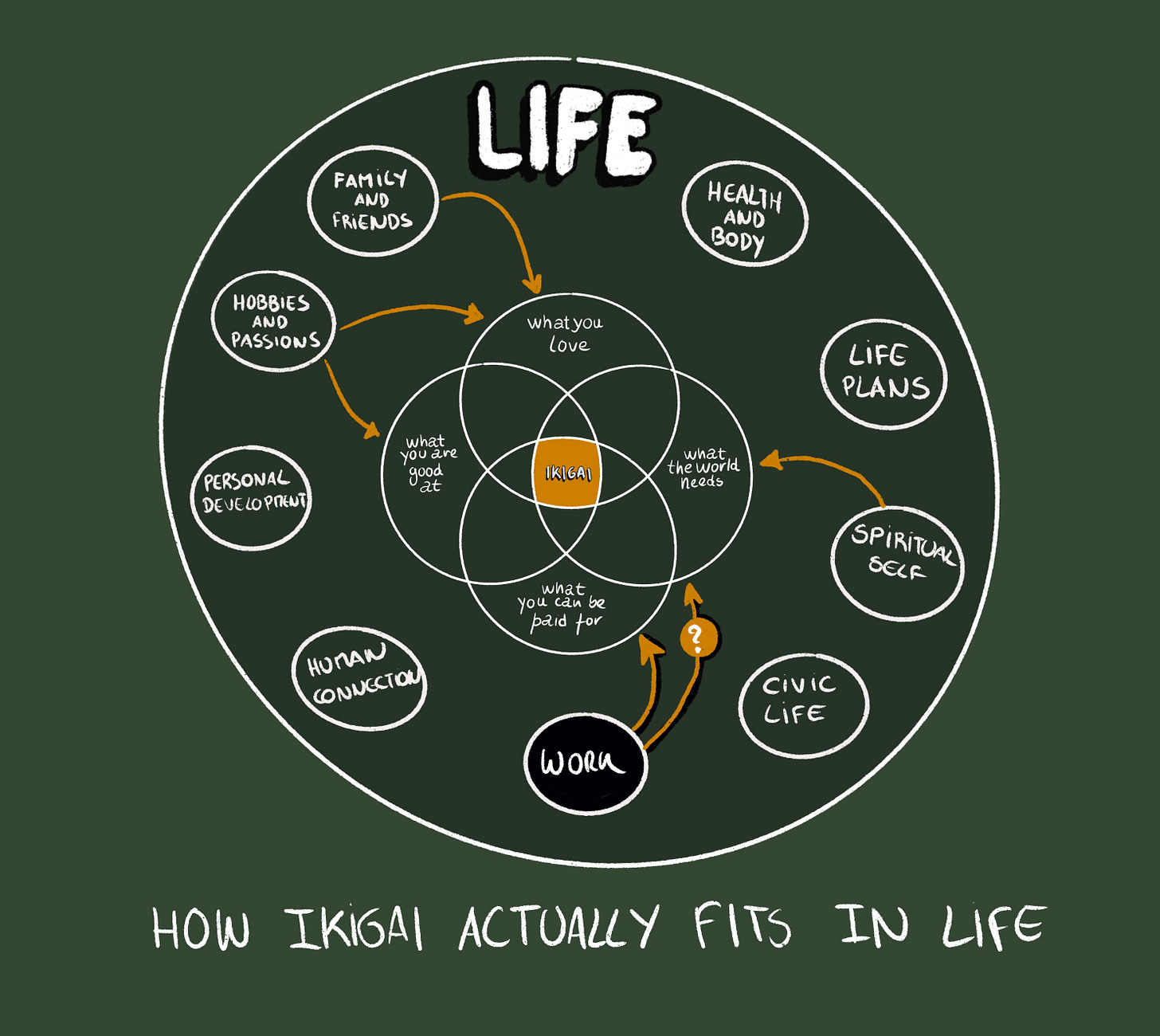The Japanese concept of Ikigai has become part of Western pop culture, seducing us with the promise of revealing the purpose behind our work and lives. Who wouldn't want to find a fulfilling career that positively impacts the world, a job that we love and excel at, and for which we're paid well? It seems like a dream come true, doesn't it? Countless times, I've heard it from clients, friends, and myself: "I'm searching for my Ikigai." It's become an obsession, a relentless pursuit that threatens us to miss the essence of life itself if not found soon enough.
Work, in our society, is a means of survival. The golden ticket allows us to pay our bills, save up, and secure a stable future. Money inevitably worms its way into the equation, particularly for those working in lucrative sectors like the tech industry. Money is often a top priority as people try to actualize their Ikigai.
The problem with the western way of seeing ikigai is too focused and enmeshed with the view one needs to make money out of it, and a good living at that.
This is problematic. The amount of pressure that comes with it is immense. The infinity of Factors and variables that dictates where one can make money from is something that is out of our control. The economy, politics, world events, the shareholder greed. This obsession of finding the ikigai that pays us the bills do us more harm than good, and distracts us from the real meaning and impact of it.
In that quest for Ikigai we are often sent back into the industries and roles that leave us feeling purposeless, just another cog in the machine. The paycheck might be fat, but at what cost? This is the trap. To burden one job with the responsibility of encapsulating all aspects of Ikigai is a misinterpretation that strips the concept of its essence and meaning. It sends us into a rabbit hole pursuit that never ends, leaving us emptier and more lost at each step.
Ikigai isn't a checkbox waiting to be ticked off. It's a state of being, an inner tranquillity derived from a sense of satisfaction and purpose. Realistically, we might find our Ikigai outside our working sphere or in unexpected, uncharted territories. Or we might find at work, but there will be other tradeoffs - and often is money, or our mental health.
As we strive for an idyllic life, we delve into work that fattens our wallets yet starves our souls and autonomy, trapping us in a relentless cycle of searching for meaning in meaningless places.
Moreover, the Western take on Ikigai often overlooks a critical point. By trying to close the gap between 'what the world needs" and "what you can get paid for," we miss out on an essential aspect—"Where can I actually find my Ikigai?" and "How healthy is that place for me?"
Ever stop to think about the number of companies and organizations pursuing lofty missions, striving to positively impact the world? Yet, behind the scenes, they are dreadful workplaces. The number may not be conclusively documented, but we can confidently say it's more than a handful. Countless high-profile companies, cloaked in a shiny exterior of enthusiastic brand statements and buzz-worthy missions and visions, harbor workplaces ridden with burnout, stress, and discontent.
Then there's that sexy promise dangled before us: Be a part of something greater. Contributing to a significant cause of bettering our world puts us on fire and ignites our spirit. Yet how many of us reconcile this noble intention with the dull and stressful reality of our daily work? Often, our excitement towards improving the world is met by an uninspiring 'day-to-day tasks', toxic bosses, and overwork.
And so, we find ourselves caught in a peculiar predicament—an apparent discrepancy between idealized promises and the actual state of things. This is not to bring down the efforts of countless organizations and people striving for positive change; it's simply highlighting an understated reality, a consideration often overlooked in our pursuit of Ikigai, as typically introduced by Western interpretations.
Remember that you may be part of an organization impacting the world positively, but if your daily tasks feel meaningless and demotivating, are you genuinely experiencing Ikigai? Don't be lured by the appeal of a distant impact alone if it doesn't contribute to your personal journey of fulfillment and daily happiness.
Navigating life through the lens of Ikigai can feel like an uphill battle, but only when we view it through our capitalistic, materialistic lens. Yes, ticking every box of Ikigai seems daunting—the search for what you love, what you're good at, what the world needs, and what you can get paid for. And the brutal truth? This utopia might forever remain out of reach.
As we welcome a new year, when we typically plan for significant changes, set goals, and evaluate life's purpose, I encourage you to view Ikigai differently.
It's not solely about finding that perfect job or career. It's a holistic concept about finding joy and purpose in our daily tasks, their impact on the world, and, ultimately, finding meaning in life as a whole.
Extend the concept beyond work. Reflect on your Ikigai in all life's dimensions. Ease the throttle on your relentless quest for the perfect job; there's more to life than work. Can your work nourish other parts of your life, even if it doesn't fulfill every aspect of your work-related Ikigai? Are you willing to make trade-offs?
Take a step back from that relentless pursuit. Instead, consider this an invitation to explore other ways your work might contribute to your broader life purpose. Could you find fulfillment in unexpected corners of life, or other ways to work?
Revisit and reevaluate your mandatory "requirements." Dive deep to uncover which ones genuinely matter to you and which ones you're willing to let go of. When looking for meaningful work, what's more critical? The daily tasks, the people you work with, the mode of your work, the overarching impact of your labor, or how work contributes to your life as a whole?
The concept of Ikigai isn't a trap. It's a compass guiding you toward a more meaningful life. It's time we shift our understanding from the shiny, misconstrued interpretation to the truly profound and holistic essence of Ikigai.
How can you weave Ikigai—a sense of purpose and wholeness—into areas beyond work? How can your work help cultivate a life steeped in Ikigai?








